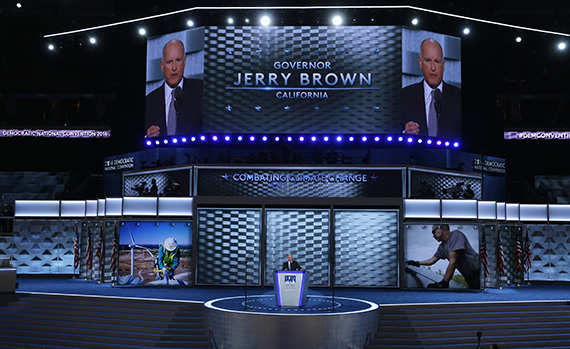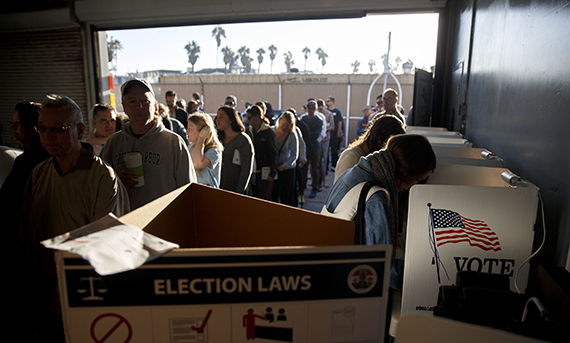TRD Special Report: In the fifth and final installment of The Real Deal’s series on the Neighborhood Integrity Initiative, we look at the ways in which the NII and Build Better L.A. could be challenged — in and out of court.
When the city tallied the results for ballot Measure JJJ, some in the real estate industry said they could hear the screeching breaks on the Pacific Coast Highway as investors, some still in Trump-shock, steered clear of Los Angeles.
The passage of the labor-backed measure dubbed Build Better L.A. — which mandates all developers seeking zoning amendments pay their workers union-approved rates and reserve up to 40 percent of units for low-income households — is already having a chilling effect on investment, experts told TRD.
Now, many developers, consultants, brokers and land use attorneys are in a huddle trying to determine what to do next. They are looking at ways in which the measure can be challenged — before it is potentially copycatted in other jurisdictions across the state.
Meanwhile, looming in the distance is the March vote on the even-more-restrictive Neighborhood Integrity Initiative. The experts interviewed by TRD agreed there is grounds to challenge both JJJ and, if it passes, the NII, potentially invalidating the legislation. Read on for a dive into the issues in play and some of the theories on how both measures could be defeated.
Ground control to Jerry Brown

PHILADELPHIA, PA – Governor Jerry Brown speaking at the Democratic National Convention (Alex Wong/Getty Images)
If Gov. Jerry Brown were to take action, state legislation could invalidate the measures, said Allan Abshez, a real estate attorney and partner at Loeb & Loeb.
“State legislation could preempt [JJJ’s] prevailing wage dictate,” Abshez said.
The affordable housing mandate, he said, would be harder to challenge because there is already precedent for it in San Jose. But California legislators could take on the labor portion of the ordinance, determining that prevailing wage is set by the state, which would make the measure inconsistent with state laws, he said.

David Waite (Cox Castle Nicholson)
David Waite, a partner at Cox Castle Nicholson whose expertise is in land use and environmental law, agreed.
“There is the idea that initiatives shall not impede upon the adjudicative functions of local government, and when you have one that does, it potentially runs afoul of California law,” he said.
The state could also assign the function of zoning exclusively to legislative bodies, preventing the implementation of the measures.
“The legislature can say that planning and zoning powers are a critical state function and that voters cannot restrict the process,” Abshez said. “I actually think that is something that is going to be looked at in the face of these initiatives, which are new. [For the NII] to reach into the function of a city as complicated as Los Angeles and declare an emergency moratorium without showing there is an emergency — that is [taking on] a critical government function.”
While the issue could be raised in court, addressing it at a state level is the ideal solution, Abshez said.
“Litigation creates a zone of uncertainty,” he said. “To address them in court will take time, and in the meantime, you have relocation of capital.”
A spokesperson for Gov. Jerry Brown’s office declined to comment on whether the state would get involved.
The single subject matter rule

Voters wait in line to cast their ballots at the Venice Beach lifeguard station polling location in Los Angeles on Tuesday, Nov. 8, 2016. (Patrick T. Fallon/Getty Images)
If it comes down to it, legal action could be taken in an attempt to prevent the city of Los Angeles from enforcing the measure, Waite said.
One way in could be through California’s single subject matter rule, he said. Ballot measures in the state must focus on a single issue, so voters are not confused. With the NII, “the question would be whether or not the broad-based goals of the measure violate the single subject matter,” he said.
The NII’s initiative text cites traffic reduction, a revision of the city’s zoning rules and the prohibition of so-called spot zoning among its goals. These, Waite said, are arguably different issues.
But Jerry Neuman, a partner in the land use and government relations department at Liner, said this approach could work for JJJ, but is not likely to be successful for the NII — which he called a more polished, fine-tuned measure.
“JJJ is more subject to [the single subject matter rule] because it takes on both labor and affordable housing,” he said. “[The NII] arguably deals with only one issue: planning.”
The city takes a backseat

Los Angeles Mayor Eric Garcetti at the construction site of the Wilshire Grand, DTLA’s tallest tower in development, which is slated to open in 2017.
The city of L.A. could also take legal action to invalidate the measures. But the experts interviewed by TRD said that is an unlikely scenario, given that city leaders have been squeamish about interfering with them from the jump.
In the months before the election, Mayor Eric Garcetti was making his campaign rounds, promoting his pet ballot measures in signature heartwarming speeches.
He touted Measure M, the countywide sales tax increase for public transportation, and Measure HHH, the city’s bond to build housing for the homeless, at every given gala. He even gave his two cents in favor of upholding L.A.’s ban on plastic bags at supermarkets. But he stayed silent on JJJ, an unprecedented proposal that would impose some of the nation’s most demanding affordable housing and wage mandates on private development.
This infuriated opponents of the measure, who said leadership was needed to educate voters about its implications. It seemed “innocuous,” according to Abshez, in the ballot text: most people agree that affordable housing and good wages are a positive thing. But detractors, including the Los Angeles Times editorial board, said the labor mandates would increase the cost of development so significantly — while the affordable mandates simultaneously diminished returns — that developers would decide not to build in Los Angeles. The lack of new supply during a housing crisis, they said, would make rents more expensive, rather than more affordable.
City Council President Herb Wesson; Council member Gil Cedillo, who leads the housing committee; and Council member Jose Huizar, who leads the planning committee, also declined to opine. Now, the people have spoken — voting JJJ into law — and still, the politicians remain silent.
“Labor is influential,” Abshez said. “Elected officials are in the elected officials industry, so even if they understand the great dislocation that could happen, they may not speak up. They have disincentive [to do so] because they are concerned they will lose union support…and also [worry] if they have crossed their voters, they will lose their jobs.”
Because local politicians are beholden in this way, Abshez said the onus is on the state government to take action. It is a state issue, he argued, because the union backers of the measure could easily bring it to other cities across the state. This “copycat” effect has occurred with other initiatives in the past.
Get a sweater

Allan Abshez
Despite the potential challenges, there is no doubt that the passage of Build Better L.A. and the threat of the NII is discouraging to investors. Abshez said it is already having a “chilling effect.”
“The hazard of this kind of lawmaking is that anyone doing investment has no idea what is happening — except that it can’t be good,” he said. “I’m already hearing from clients turning down deals that would require a zone change. They will look in other areas of California. That is the problem with these ordinances — there is no requirement that capital stays in Los Angeles. Money is mobile.”
Adding to the uncertainty pile is the question of how JJJ and NII will coexist if the latter passes in March. The NII doesn’t expressly say it repeals Build Better L.A. but it does say it repeals “inconsistent” parts of L.A.’s municipal code. What that entails has yet to be determined.
“That’s one of the problems with the [NII],” Abshez said. “It creates uncertainty about what should exist in the muni code. So the ordinance itself impairs government function because it creates so much confusion.”
